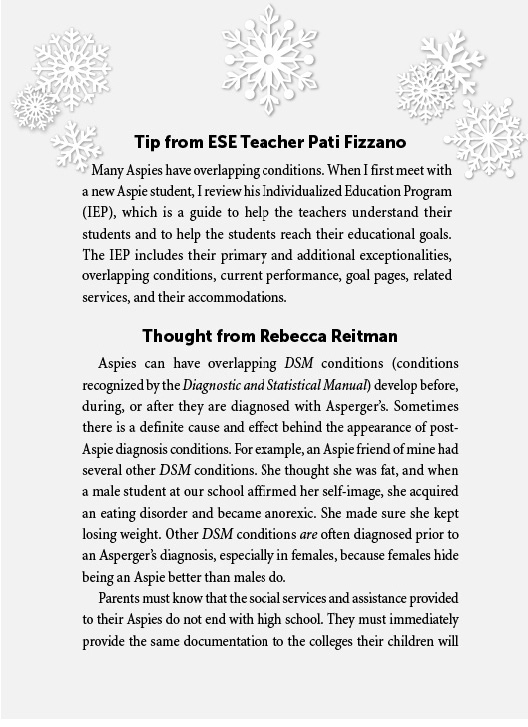
For strange effects and
extraordinary combinations we
must go to life itself, which is always
far more daring than any effort
of the imagination.
—Sir Arthur Conan Doyle
Helpful Hint: Asperger’s syndrome and its various components often occur in combination with other neurological, psychological, and physical disorders. It helps to know something about such overlapping conditions so that you can keep an eye out for any signs of them in your observation of your Aspie. You also want to document as much as possible and have a complete medical summary available. Aspies come in many flavors with many different combinations of related conditions. When you’ve met one Aspie, you’ve met one Aspie. Each one is unique.
Principle: It’s the rare affliction that does not occur without overlapping, related conditions. This can lead you into countless esoteric chicken-or-the-egg debates. But the important thing is not which condition came first but to make sure you’re aware of all the conditions your Aspie must deal with, not because of the labels but because of the interrelationships of all these conditions.
Anxiety plays a major role in any mental or psychological condition you can think of. But in an Aspie, anxiety is magnified to the umpteenth degree. Besides learning to deal with anxiety, you will also need to be on the lookout for obsessive-compulsive disorder (OCD), ADHD, and variations of attention-deficit disorder syndromes, as well as other serious problems like seizure disorders or epilepsy.23 Related physical disorders such as gastrointestinal disorders and, in some cases, hypersensitivity are within the intestinal system of the Aspie. The key is to know as much as possible about all the related neurological and psychological conditions. I could dazzle you with a bunch of other abbreviations, eponyms, and fancy names, or you could find them with a search engine, just as I did.
23 There are also all kinds of overlapping indications for medications. Some antiseizure meds are also antianxiety meds/sleeping meds/mood changers. Off-label use has opened up what some feel is a harmful Pandora’s box and what others hope is a magic bullet. And let’s face it; we well-intentioned parents are always seeking magic bullets.
Don’t let my MD fool you. Just to repeat, I’m not writing this book as a medical professional. Like you, I’m just another “well-intentioned parent” who was once totally clueless but has now ascended to the lofty perch of “less cluelessdom.” Of course, it’s a lot easier to be less clueless today than back when I was in med school, when learning about a medical condition meant a trip to the graduate stacks at the university library. Now you can get an in-depth explanation of anything by typing a few keywords into your search engine. So you can learn a lot in a little time about any issue that comes up with your Aspie.
ACTION PLAN: Make sure appropriate specialists have fully evaluated your Aspie and that you have in your possession one comprehensive medical summary. You might have to compile it yourself. We doctors used to joke that as everything in medicine got more specialized, specialists knew more and more about less and less until ultimately they knew everything about nothing. That joke is not so far-fetched anymore. Things are so specialized today that the various specialists have a difficult time communicating with one another.
Because of this situation, one of your many tasks is to be the chief interpreter and translator of your Aspie’s medical history. Someone has to have a comprehensive copy of the medical records, medications, and medical tests, as well as an overall summary of them. This way, if your Aspie visits a new specialist—psychologist, psychiatrist, neurologist—you can just hand them the medical summary, along with any supporting reports. (This will also come in handy when applying for various programs, accommodations, and services). Doing this forces all concerned parties to be aware of the entire situation and all overlapping conditions. Asperger’s syndrome rarely exists in a vacuum. Neither does any other problem for the Aspie or, for that matter, the neurotypical. Nobody gets a pass.


